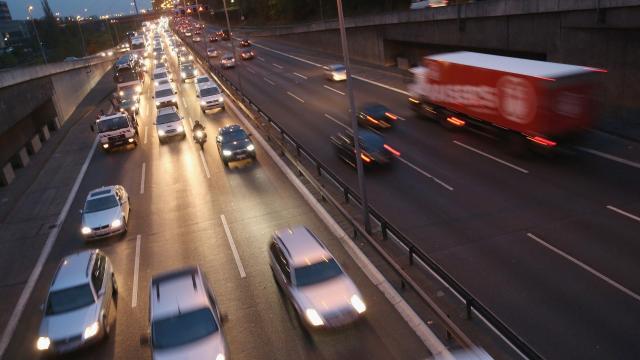France has taken a unique step to remind people cars suck. In December, the country passed a law requiring the creators of car commercials to encourage viewers to try not driving a car — at least, whenever it’s possible.
The world is barreling towards what basically all scientists (and Adam McKay) are warning is a climate catastrophe if fossil fuel use isn’t ended. One of the best ways to do that is reducing reliance on personal, gas-powered vehicles. (To say nothing of the air pollution reduction and other benefits that would accrue with less driving.) But how to do that is a bit of a challenge. Indeed, while most folks are aware that driving cars is bad in a vague existential sense, it’s still fairly difficult to pry ourselves away from them — especially when so much of our media culture reinforces the idea that cars are cool and safe and good.
France’s law — passed in December — offers a small behavioural nudge. Advertisements must now include reference to travel alternatives, such as walking or biking, taking public transportation or, at the very least, carpooling.
Under the new law, commercials aired in the country will be obligated to include one of the following phrases in their ad copy: “For short journeys, walk or cycle,” “Think about carpooling,” and “On a daily basis, take public transport.” (In French, of course.) In some cases, the ads will also be required to sport the hashtag #SeDéplacerMoinsPolluer, meaning “Move without pollution.”
The legislation, which applies not just to TV but also to print, web, and radio ads, mandates that the messages be presented in an “easily readable or audible manner” and that they be made “clearly distinguishable from the advertising message and from any other obligatory mention.” Companies that fail to meet such requirements will be subject to stiff fines — something in the neighbourhood of €50,000 (roughly $US72,100 ($99,166)).
“Decarbonizing transport is not just switching to an electric motor. It also means using, when possible, public transport or cycling,” tweeted Barbara Pompili, France’s Minister of Ecological Transition, whose department is focused on advancing alternative energy solutions for the country.
That’s extremely true. Transportation is the biggest source of emissions in France (and the U.S. and many other developed countries for that matter). Personal vehicles are among the most carbon-intensive ways of getting around. Hopping a train or bus drastically reduces carbon intensity and overall emissions while walking and biking eliminate them entirely. Transition to no-carbon transit is absolutely vital for the world to have a shot at meeting its climate targets.
France’s law is somewhat equivalent to when the U.S. passed the Comprehensive Smoking Education Act of 1984, the likes of which forced tobacco companies to include specific Surgeon General’s warnings about cigarette-induced cancer, emphysema, and pregnancy complications on the sides of all their products. Here, like there, the message is pretty simple: Feel free to buy one of these but you’re slowly killing yourself (and the planet), you doofus.
Reminding the public to pursue modes of travel that don’t involve personal gas-powered vehicles is great. But it can’t all be on individuals to make that transition happen. France — or any other country for that matter — also needs to make no-carbon means of getting around accessible for all. The country banned short-haul flights where rail options are available last year, which is good. But it was also just a few years ago that France faced a revolt over a gas tax that would’ve screwed rural folks who lacked the infrastructure to get around outside of their own vehicles. Telling people to hop on a bike is a great first step. Ensuring everyone can do that is has to be the next one.
